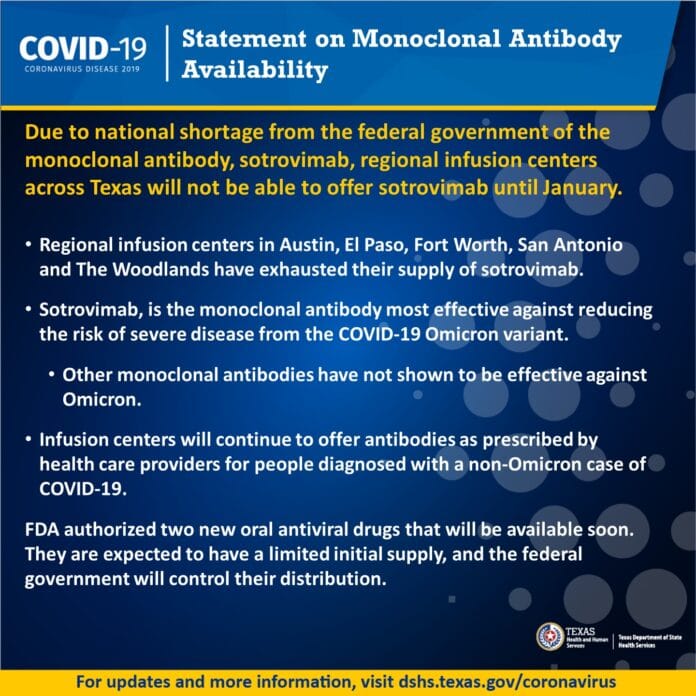Monoclonal Antibody Shortage Halts Some Therapeutic Treatment
Remember last week when Ferris City Manager was sounding the alarm about monoclonal antibodies and the omicron wave crashing towards Texas? Well, he was right, the government was unprepared and the shortage is impacting Texans this week.
The problem: monoclonal antibodies that were effective in treating COVID-19 prior to Omicron aren’t effective against the new variant that is dominating COVID-19 cases across the country and our state.
Ferris City Manager said this last week, “How many times do we have to be caught flat-footed before we will realize that proper and prior planning prevents pitiful performance – performance in this instance being the availability of vaccines and or therapeutic treatments for people who are being told to get the vaccines, get the therapeutic treatments, but are left empty handed when it comes to where to get the treatment right now.”
Today, Texas Department of Health and Human Services issued this statement:
The federal government controls the distribution of monoclonal antibodies, and the regional infusion centers in Austin, El Paso, Fort Worth, San Antonio and The Woodlands have exhausted their supply of sotrovimab, the monoclonal antibody effective against the COVID-19 Omicron variant, due to the national shortage from the federal government.
They will not be able to offer it until federal authorities ship additional courses of sotrovimab to Texas in January. People who had appointments scheduled this week will be contacted directly and advised. Other monoclonal antibodies have not shown to be effective against the Omicron variant, which now accounts for more than 90 percent of new cases. The infusion centers will continue to offer those antibodies as prescribed by health care providers for people diagnosed with a non-Omicron case of COVID-19.
Two new oral antiviral drugs authorized last week by the Food and Drug Administration will be available soon, though they are expected to have a limited initial supply, and the federal government will also control their distribution.
People with COVID-19 infections at high risk of hospitalization and death should contact their health care provider to discuss treatment options. Everyone should protect themselves from severe COVID-19 by getting vaccinated as soon as possible, getting a booster as soon as they are eligible, and continuing to take precautions to prevent being exposed to the virus that causes COVID-19 and spreading it to others.
The timing of a shortage of therapeutic treatment’s is terrible with the exponential rise in positive COVID-19 cases which is only expected to get worse with holiday gatherings and travel. There’s also a shortage of at home test kits as people are scrambling to test before and after travel, before gathering with family, and before returning to work after holiday vacation.
New case reporting is being impacted by the holidays and the latest data on the DSHS dashboard is from 12/23/2021. However, on 12/22 DSHS was reporting cases have doubled and that trend is expected to continue.











